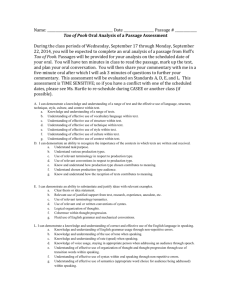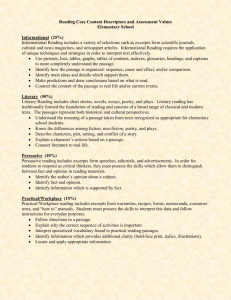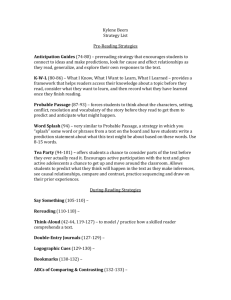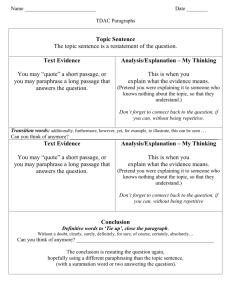Critical/Analytic Reading(s) Critical Dialogue = reading "against" the
advertisement
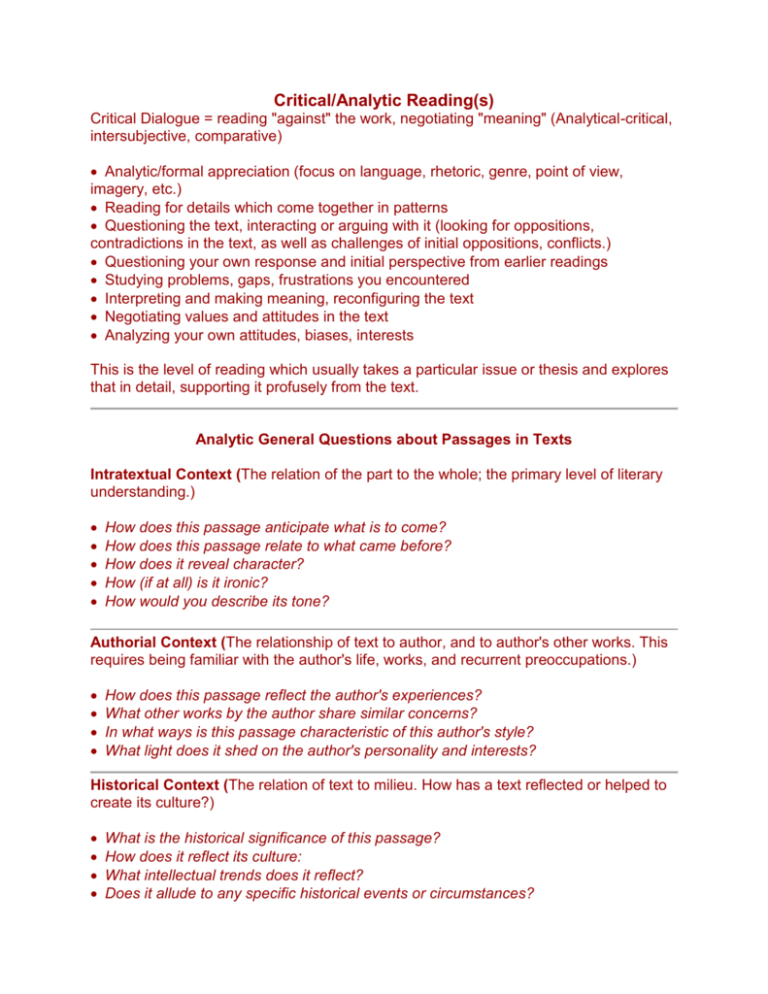
Critical/Analytic Reading(s) Critical Dialogue = reading "against" the work, negotiating "meaning" (Analytical-critical, intersubjective, comparative) Analytic/formal appreciation (focus on language, rhetoric, genre, point of view, imagery, etc.) Reading for details which come together in patterns Questioning the text, interacting or arguing with it (looking for oppositions, contradictions in the text, as well as challenges of initial oppositions, conflicts.) Questioning your own response and initial perspective from earlier readings Studying problems, gaps, frustrations you encountered Interpreting and making meaning, reconfiguring the text Negotiating values and attitudes in the text Analyzing your own attitudes, biases, interests This is the level of reading which usually takes a particular issue or thesis and explores that in detail, supporting it profusely from the text. Analytic General Questions about Passages in Texts Intratextual Context (The relation of the part to the whole; the primary level of literary understanding.) How does this passage anticipate what is to come? How does this passage relate to what came before? How does it reveal character? How (if at all) is it ironic? How would you describe its tone? Authorial Context (The relationship of text to author, and to author's other works. This requires being familiar with the author's life, works, and recurrent preoccupations.) How does this passage reflect the author's experiences? What other works by the author share similar concerns? In what ways is this passage characteristic of this author's style? What light does it shed on the author's personality and interests? Historical Context (The relation of text to milieu. How has a text reflected or helped to create its culture?) What is the historical significance of this passage? How does it reflect its culture: What intellectual trends does it reflect? Does it allude to any specific historical events or circumstances? Allusive Context (The relation of text to other texts, past and present or "intertextuality." The reader's familiarity with texts presupposed by the writer) What if anything is the source to which this text refers? What other texts--past or contemporary--does the passage allude to? Is the allusion ironic? How? How likely is it that the author would have been familiar with the text(s) alluded to? What is your evidence for this? Generic Context (The relation of text to other texts of a similar kind, past, present, and future. Unlike Allusive Context, this consists of diachronic (cross-time) questions of literary typology not necessarily linked to authorial intent or deliberate allusions) How would you describe the style of this passage (or its work)? What aspects of the passage remind you of other texts of the same kind? What are identifying stylistic features that put it into this genre? What would a reader expect as a result of reading this kind of passage? How does this particular passage fulfill or undercut these expectations? Philosophical Context (The relationship of the text to the world of ideas, past, present, and future. It may include how the text can be mapped onto specific religious or philosophical systems or ideologies (e.g. Christianity, Marxism, Freudian or Jungian psychology, feminism, etc.) What ideas or assumptions are expressed or implied in this passage? How valid or defensible are these ideas? What (if any) are the social and political implications of these ideas? How pertinent are these ideas to modern life? Subjective Context (The relationship of the text to the reader's experience. Although this context is often overlooked in criticism (since, by its nature, it is not subject to any kind of rigorous argumentation or research), it is nonetheless the primary reason that authors write: to engage a reader's sympathetic interest by appealing to commonalities of experience) What in your own experience does this passage recall for you? What other stories does it remind you of? How is it similar or different? How (if at all) has it shed insight into your own life experiences? Return to Woodlief's home page Virginia Commonwealth University www.vcu.edu/engweb/eng301/criread.htm




